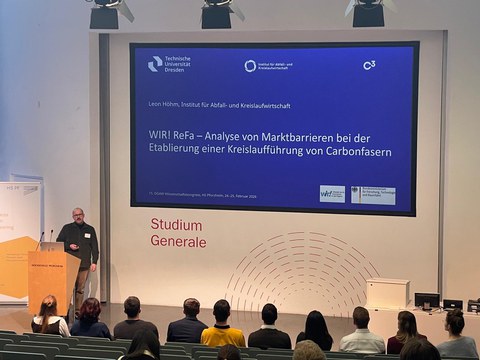Research project Collection and sorting of fibrous waste and recyclable materials
Collection and sorting of fibrous waste and recyclable materials
| Partner: |
H. Nestler GmbH & Co. KG |
|
Funding: |
BMBF - Federal Ministry of Research, Technology and Space |
| Duration: |
April 2024 - March 2026 |
| Contact persons: |
Leonie Dahlmann |
Project description:
The WIR-V1.1 project aims to systematically record, collect, and sort fiber-containing waste from various industries and sources. To this end, a circular, digitally supported logistics and recording system will be developed, implemented, and permanently established. The aim is to initiate the recycling of fiber-containing waste and recyclable materials, with a particular focus on innovative business models. The project thus makes a significant contribution to the bundling and economic use of fiber-containing material flows, which will be of economic importance in the Elbe Valley region of Saxony for the first time.

Leon Höhm speaks at the 15th DGAW Science Congress in February 2026 in Pforzheim about the results of the WIR! project.
The joint project WIR-V1.1 pursues six central objectives aimed at establishing a sustainable and economically viable circular economy for fiber-containing waste in the Elbtal Saxony region.
A central objective is the design and implementation of a circular logistics system for the systematic collection and bundling of fiber-containing waste. To this end, a digitally supported collection system is being developed for use in practice, which will enable the regional consolidation of previously scattered material flows. In this way, sufficient quantities of fiber-containing material are to be generated, which can then be sent for material recycling. This forms the basis for a functioning regional material cycle.
In addition, the promotion of ecological sustainability is a central focus. The project aims to specifically reduce CO₂ emissions along the individual process stages of the circular value chain. The measures are based on national climate targets and actively contribute to the ecological transformation of industrial value creation through the development of low-emission processes and optimized workflows.
In addition, the economic sustainability of the project is also addressed. Efficiency gains in all process steps are intended to make the entire system economically viable. The aim is to secure the financial basis of the project beyond its duration and to create the conditions for the long-term establishment of circular economy approaches in the regional economic system.
Another objective is to initiate and develop a real material cycle for fiber-containing composite materials. To this end, relevant actors in the region will be networked and joint strategies for dealing with fiber-containing waste will be developed. At the same time, the regulatory framework will be further developed and adapted to the requirements of a sustainable circular economy. The Elbe Valley (Elbtal Sachsen) region is thus set to become a model area for modern waste and recyclable materials management.
Another key area of activity is the reduction of existing market barriers and the development of innovative business models. Targeted cooperation and new economic links within the circular economy will strengthen the resilience of local companies. This should not only increase the attractiveness of the location, but also provide new economic impetus for structural change in the region.
Finally, the project is dedicated to establishing new technical approaches aimed at the quality-assured and single-type provision of fiber-containing waste. Optimized sorting and processing will make downstream recycling processes more efficient, bringing both economic and ecological benefits.
